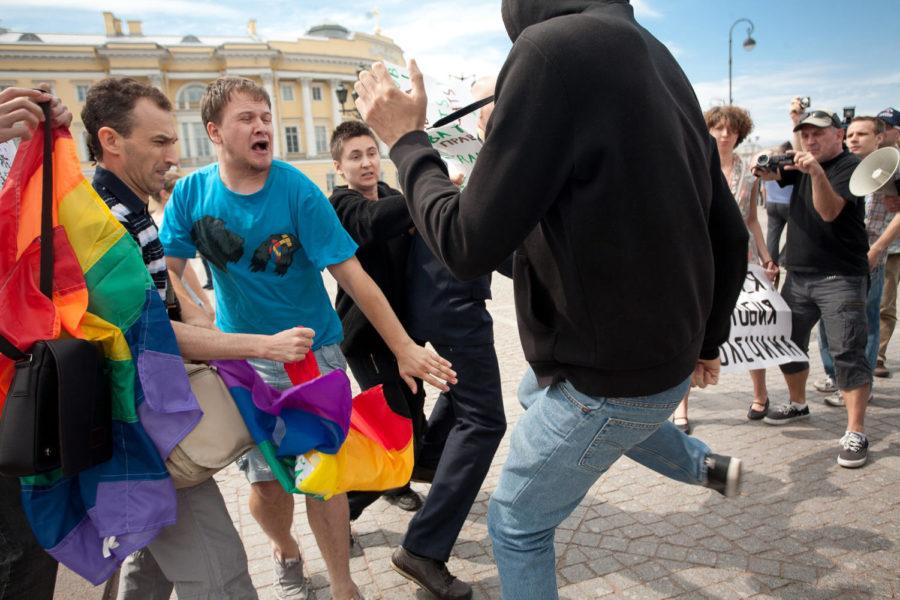Editorial: Russia’s regressive tendencies are going unnoticed
Russia
November 15, 2013
Ah, Russia, expansive land of bitter cold, vodka, and a host of other stereotypes not actually borne out by reality. Unfortunately, there is one Russian stereotype that may very well be on its way back to the real world: a highly oppressive and largely unaccountable government.
The president of Russia, Vladimir Putin, took his current office for the first time in 2000. He went on to win reelection in 2004, and was unable to run for a third consecutive term in 2008 due to constitutional constraints. Instead, he became Prime Minister for four years and is now well into his 2012 term as President yet again.
The politics of Russia, exemplified by President Putin — a former KGB lieutenant colonel — may not be the communist bastion they once were but have nonetheless caused more than a little concern among Russian citizens and international onlookers.
Examples of these political backtracks abound, but perhaps none is more famous than the arrested members of the band Pussy Riot. In February 2012, the band made an impromptu appearance at Moscow’s Cathedral of Christ the Savior where three of the band’s members were arrested and charged with hooliganism, which carries a maximum sentence of seven years in prison.
Recently, one of the jailed Pussy Rioters, Nadezhda Tolokonnikova, staged a hunger strike that ended with her being placed in the medical ward of her prison facility, and for quite some time her whereabouts were in question. Russian police have now confirmed that she was transferred to a Siberian prison complex, although they have not yet released her exact location.
Along with the jailed musicians, members of the environmental group Greenpeace and the crew of a ship they used to protest arctic drilling were taken by Russian authorities. After some Greenpeace activists attempted to board a Russian oil platform in the Barents Sea, everyone aboard their ship, the Arctic Sunrise, was arrested.
In addition to protesters who have been imprisoned, more have fled Russia in fear of being detained. Konstantin Altunin, a Russian artist, fled to and sought asylum in France this August when some of his paintings were confiscated from the St. Petersburg Museum of Power.
One of the paintings in question depicted President Putin and Prime Minister Dmitry Medvedev — who was the Russian president from 2008 to 2012 when he and Putin switched offices — in ladies’ undergarments. Under Russian law, it is illegal to insult a state authority. There was also a question as to whether or not the painting violated Russia’s law against making “homosexual propaganda” available to minors.
That very “anti-propaganda” law has drawn large criticism from the international community concerned about speech restrictions in the 2014 Winter Olympics to be held in Sochi, Russia. There have already been threats of protests to be held at the upcoming Olympic Games in support of homosexuals.
Some of the protests already happening in Russia have become quite a bit more extreme than simply distributing “propaganda,” though. Last week Pyotr Pavlensky nailed his own scrotum to the stones of Red Square in protest of Police Day, a day designated to celebrate the Russian police. Pavlensky has previously made headlines for other acts of self-harm done in protest to the current Russian state, including having sewn his lips shut in protest of Pussy Riot’s members being jailed.
While there are likely to always be public protests and demonstrations in a country the size of Russia, the response to such peaceful protests has led many to draw unsettling conclusions about the future of freedom in Russia. With a recent history as full of political oppression as Russia’s is, we should all have concerns over the direction our fellow superpower is taking.
As a leading international power, Russia has influence over the direction civil liberties move in the world. Whether we like it or not, events taking place on the opposite side of the globe affect us as well. So in this increasingly international world, we must be paying more attention to this apparent return to Soviet-era oppression.

















